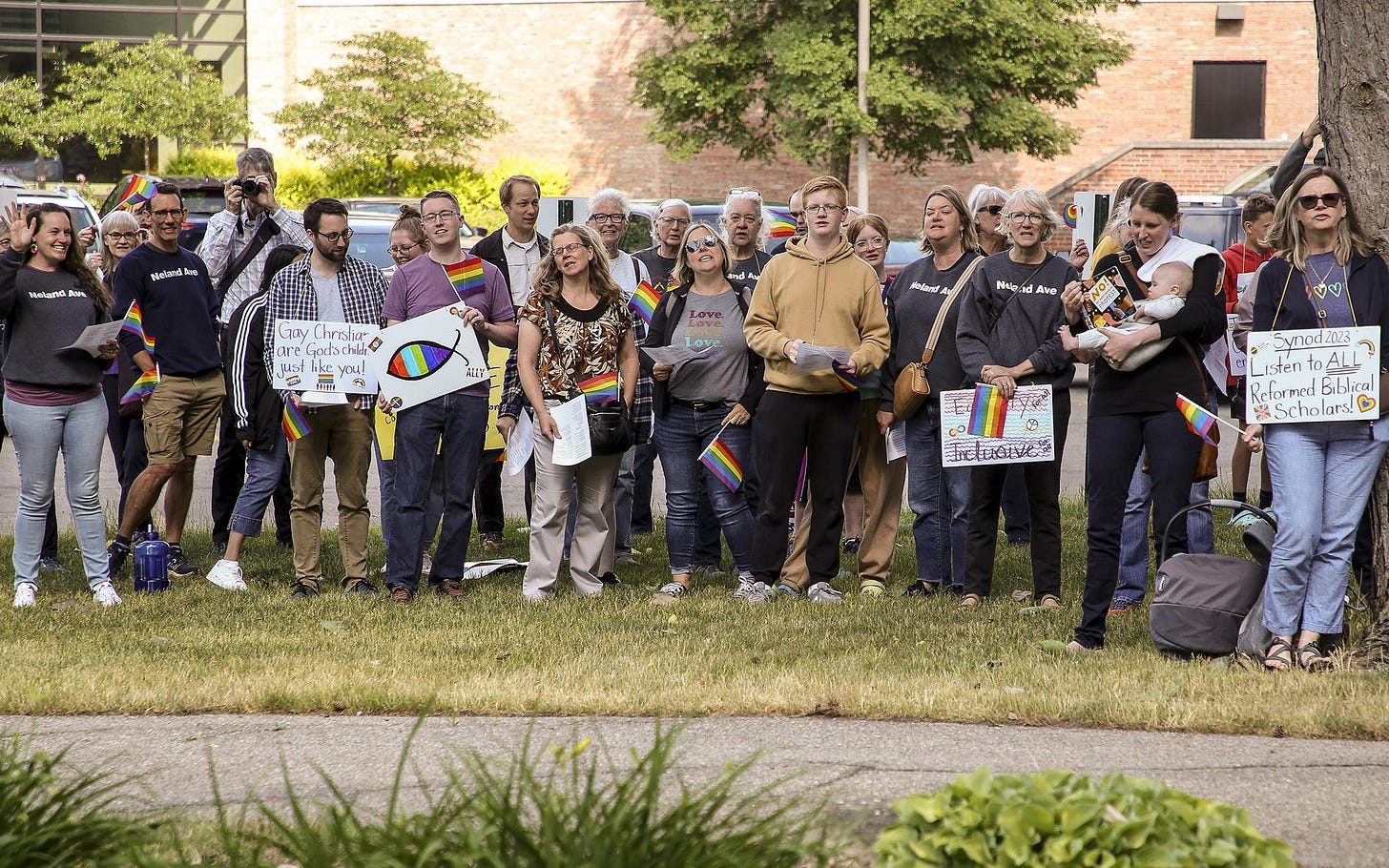Students at Calvin University, which is associated with the Christian Reformed Church, advocating for full inclusion of LGBTQ-identifying Christians in the church.
I offered my June 16 post on LGBTQ issues with some trepidation. The responses were not what I expected.
Only two readers unsubscribed. Few commented publicly, but various people contacted me privately, like Nicodemus approaching Jesus by night, to say things they seemed reluctant to say openly.
A European Christian leader sent this message:
I recently helped a charismatic pastor become a pastor in a liberal Lutheran church. [In his previous denomination] he moderated a public evangelistic event, and during the Q&A session, he was asked about LGBT issues. Instead of giving the strict, aggressive answer expected by his denomination, he gave a more nuanced response because his lesbian daughter was sitting in the pews. He did not even get a chance to explain himself, but was out quicker than one could think. He is a real loss to his church. I don't normally help liberal churches, but given that his views are similar to yours, this is the only church where he can still work. I told him that when he gets to heaven, the first thing he will be asked about is his children, not whether he appeased other evangelicals.
I hope you will not lose half of your subscribers, but that some will listen to what they need to hear.
A friend in the western United States wrote:
I was thinking about a co-worker who retired a couple years ago. She had twins and told us one day that one of them was transgender, with a new first name. Around the same time, a neighbor’s transgender son committed suicide at age 16.
I am curious about the LGBTQ community, trying to understand what goes on inside. I think I have more questions than opinions, but most of all, I believe that these people have been wrongly shunned by religious communities yet need to know God and be loved, like all of us imperfect humans, just like the “outcasts” that Jesus hung out with.
Another US friend told me that her gay son has indicated his intention to live a celibate life and has received invaluable support from the network of “Side B” Christians who seek to affirm people in his situation. She explained that when he was contemplating whether to pursue celibacy or sexual activity, she told him, “It would break my heart if you entered a same-sex marriage some day, but I would love you just the same.”
Three other respondents who identify as LGBT-affirming Christians graciously expressed appreciation for my comments, even though I stated that I maintain a traditional view of marriage and sexuality.
Two emphases were notable in the responses and conversations of the last few weeks: compassion toward all who deal with these issues, and fear of being criticized by fellow Christians for urging compassion.
The fear theme dovetailed with the message of a newly published, provocative book I’ve been reading: retired Christian university administrator and fellow Substack communicator John Hawthorne’s The Fearless Christian University. Hawthorne argues that many evangelical Christian universities in the US act too often out of fear—usually fear that donors, alumni, and prospective customers will go elsewhere if a university opens itself up to hearing multiple perspectives and welcoming authentic, open conversation on tough issues.
As one example, Hawthorne describes the backlash that Grove City College, a well-known and intellectually high-quality US school, faced after having Jemar Tisby, who addresses Christian complicity in racism, as a chapel speaker. Grove City was accused of promoting progressive views commonly referred to as “critical race theory.” Grove City eliminated diversity training and its trustees released a report assuring constituents that the school had not become “woke.”
In contrast, Hawthorne contends, “Most of the issues that trouble trustees, alumni, and donors—evolution, race, LGBTQ+ rights, gender, politics—could be managed by foregrounding the pedagogical commitments to pursue truth amid complexity.”
With regard to LGBTQ controversies, Hawthorne notes that many gay students are choosing to attend Christian universities and urges welcoming them as members of the community while acknowledging that Christians hold differing views on the topic.
One problem with Hawthorne’s argument is that in some cases, the fearful university leaders may have assessed their market accurately, and taking a more open stance on controversial matters may indeed result in decreased support and enrollment. But reactionary stances can make us appear not just insensitive but irrelevant, especially to younger generations. This is not the best way to follow a Savior who loved tax collectors and sinners.
I hope we can model, in our engagement with tough issues, how Christians should love their neighbor.

Thanks for reflecting on the book. Glad to see compassion as the primary theme among your responders.